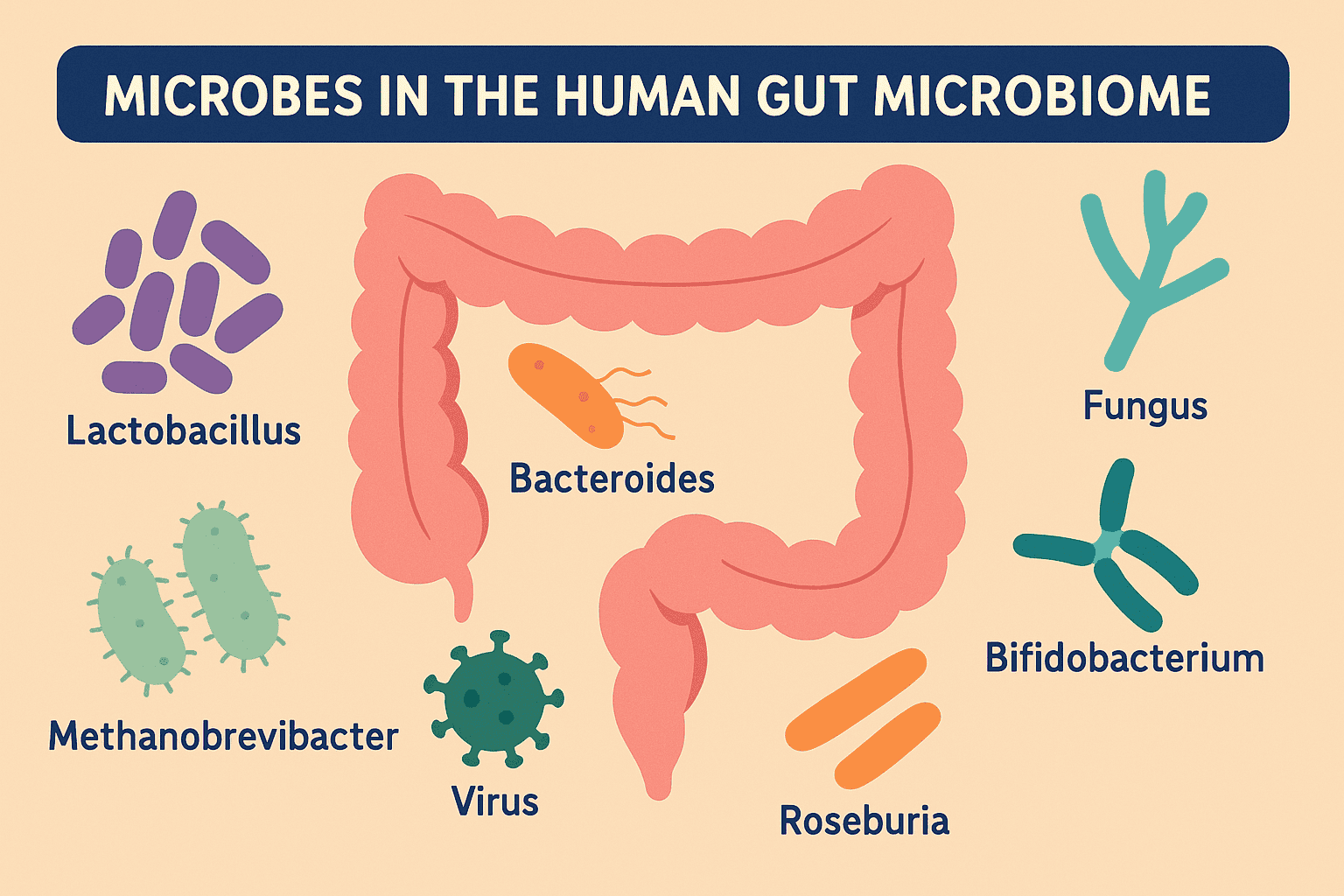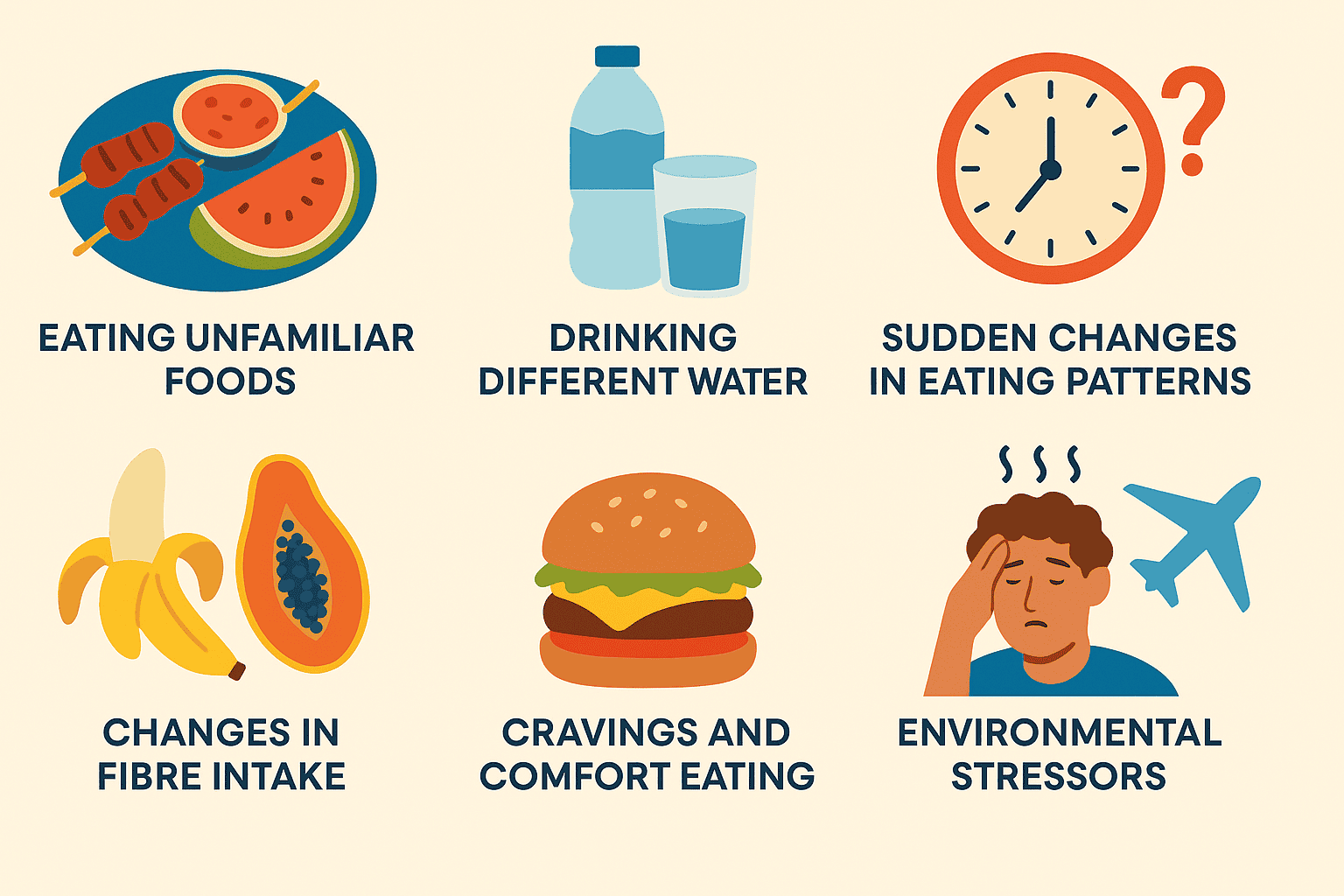Simple Steps to Prevent Stomach Upset and Maintain Your Gut Health While Travelling

Travel is an exciting way to discover new places and flavours, but it can challenge your gut health and its delicate balance. As you encounter unfamiliar foods, water, and routines, your gut microbiome may struggle to adapt, leading to bloating, cramps, or irregular digestion, not always from infection, but from rapid change. The good news? With a few smart habits before, during, and after your trip, you can keep your gut resilient and focus on the adventure ahead
Why Your Gut Hates Vacations (And It’s Not Always an Infection)
Travel is exhilarating; new foods, vibrant cultures, and exciting landscapes. But it can also stir up something less glamorous: gut trouble. While most people worry about food poisoning or traveller’s diarrhoea, the real culprit is often more subtle. Non-infectious gut issues are incredibly common and usually stem from a sudden shift in your microbiome, the trillions of bacteria, fungi, and viruses that live in your digestive system.
Spicy street food, unfamiliar ingredients, changes in water, altered meal times, and even jet lag can throw your gut into a spin. This imbalance might be caused by a bug or infection; it could be just your gut flora struggling to adapt. The result? Bloating, mild cramps, diarrhoea, constipation, or nausea, often without fever or severe symptoms.
Understanding the science behind your belly blues helps you take back control. Travel should expand your horizons, not your toilet trips. With a little gut-friendly prep, you can enjoy your journey without any digestive detours.
The Real Culprit: Your Gut Microbiome in Chaos
- Eating Unfamiliar Foods: Sampling spicy street food or exotic fruits is one of the greatest joys of travel, but it can also be a shock to your gut. These new foods often introduce unfamiliar microbes, spices, and preparation methods that your digestive system isn’t used to. Even healthy or hygienically prepared meals, as per a recent interview posted by University of Utah, can temporarily upset your gut flora, which may result in bloating, discomfort, or altered bowel habits. If you’re used to a certain style of cuisine at home, rich gravies, fermented foods, or even tropical fruits might push your microbiome out of balance. To ease the transition, try local dishes in moderation, eat slowly, and allow your body time to adjust.
- Drinking Different Water: Even water that is safe by local standards can contain different bacterial strains or mineral compositions that your gut isn’t accustomed to. In regions where tap water isn’t treated the same way as it is in your home country, this can be a fast track to mild digestive issues like gas, stomach cramps, or loose motions. This isn’t necessarily due to contamination. It could be your microbiome reacting to the unfamiliar contents. Regardless, be safe and stick to bottled water or filtered, boiled water. Be mindful of ice cubes and juices made with local water, too.
- Sudden Changes in Eating Patterns: Travelling usually disrupts your normal routine, and your gut notices. Skipping meals, eating late at night, or binging after long gaps can confuse your internal digestive rhythm. Your microbiome thrives on consistency; erratic eating can lead to sluggish digestion, bloating, or heartburn. If you’re hopping time zones, aim to eat light and nutritious meals at your new local meal times within the first couple of days. Avoid the temptation to go long hours without food, and try to re-establish a regular eating window to help your gut find its rhythm.

- Changes in Fibre Intake: You might be used to a specific amount of dietary fibre at home, whether from salads, whole grains, fruits, or legumes. While travelling, fibre intake often changes drastically—either increasing with fresh produce and salads or decreasing if you indulge in more refined and processed foods. This sudden fluctuation can throw your digestion off balance. Increased fibre without enough water may cause bloating and gas, while a fibre deficit may lead to constipation. Try to maintain a balanced intake by including fruits like bananas or papaya and choosing wholemeal options when available.
- Cravings and Comfort Eating: Being in a new and unfamiliar place can subconsciously lead you to reach for foods that feel safe or comforting, often processed, sugary, or high in fat. Fascinatingly, certain gut bacteria can influence these cravings by sending signals to your brain, encouraging you to feed them what they thrive on.
- Environmental Stressors: Travel is stimulating, but it’s also taxing on the body. Long flights, disrupted sleep, dehydration, high altitudes, or hot and humid climates can impact your gut function. Jet lag, in particular, disturbs your circadian rhythm, which governs not only sleep but also digestion. Add to that the stress of navigating new transport, languages, or customs, and your gut may respond with nausea, bloating, or irregular bowel habits. Build in rest time, stay hydrated, and don’t underestimate the impact of psychological stress on your digestive health.
Preparations Before Travelling
- Eat a diet rich in fibre (fruits, vegetables, whole grains) and fermented foods (yogurt, kefir, sauerkraut) in the weeks leading up to your trip, to help in improving gut health. This helps cultivate a more diverse and resilient microbiome that’s better equipped to handle change. Fermented foods feed beneficial gut bacteria and can help build a buffer against digestive disruptions.
- Consider taking probiotic supplements with strains like Lactobacillus and Bifidobacterium before and during your trip. These supplements can help reinforce your gut barrier and improve microbial diversity. However, their effectiveness can vary from person to person, so it’s best to start a couple of weeks early to gauge your body’s response.
- Speak with your doctor about destination-specific precautions. You may need vaccines such as cholera or typhoid, depending on where you’re travelling. Carry preventive medications when recommended, but don’t take antibiotics without proper guidance, as they can wipe out good bacteria and worsen dysbiosis.
- Good hand hygiene is critical: wash your hands thoroughly with soap and water before meals and after restroom use. Carry alcohol-based hand sanitiser for situations where soap isn’t available. This small habit can significantly reduce your exposure to unfamiliar microbes.
- Be cautious with what you eat. Avoid raw seafood, undercooked meats, salads washed in untreated water, or unpeeled fruits, especially in destinations where sanitation standards may vary. Choose hot, freshly cooked meals and opt for bottled drinks with sealed caps.
How to Travel Safely
- Stick to hot, cooked foods over raw or unpeeled items, especially in street markets or unfamiliar eateries. Heat kills most harmful pathogens, making freshly prepared food a safer option.
- Always drink bottled or properly boiled water in regions with uncertain tap water quality. This includes using bottled water to rinse your mouth or make tea, and avoiding ice unless you’re sure it was made with treated water.
- Keep hand hygiene a priority. Washing with soap and clean water is best, but hand sanitiser can help in a pinch, especially before eating or handling snacks on the go.
- Manage stress actively. Travel delays, sleep disruptions, and tight schedules can add up. Get sufficient rest, hydrate often, and take quiet breaks to keep your body calm.
- Only use antibiotics or over-the-counter medications if prescribed by a healthcare professional. Self-medicating can cause more harm than good and worsen gut imbalance.
- If you do experience stomach upset, focus on hydration. Oral rehydration salts can help replenish lost electrolytes. Stick to bland, easy-to-digest foods like rice, bananas, and toast until your symptoms improve. Listen to your body, rest, eat light, and give your gut time to recover.
- If symptoms like severe pain, high fever, or persistent vomiting/diarrhoea occur, seek medical attention promptly. It’s better to be cautious than let a minor issue escalate.
In the end, protecting your gut while travelling isn’t about avoiding every street snack or worrying over every meal. It’s about being aware, prepared, and kind to your microbiome. Small, consistent habits like maintaining a balanced diet, staying hydrated, and managing stress can go a long way in preventing digestive disruptions. By taking proactive steps before and during your journey, you give your gut the tools it needs to adapt smoothly, letting you focus on the experiences that matter. Because the memories you bring back should be of vibrant flavours and breathtaking sights, not uncomfortable stomach stories.
Read more – Latest



